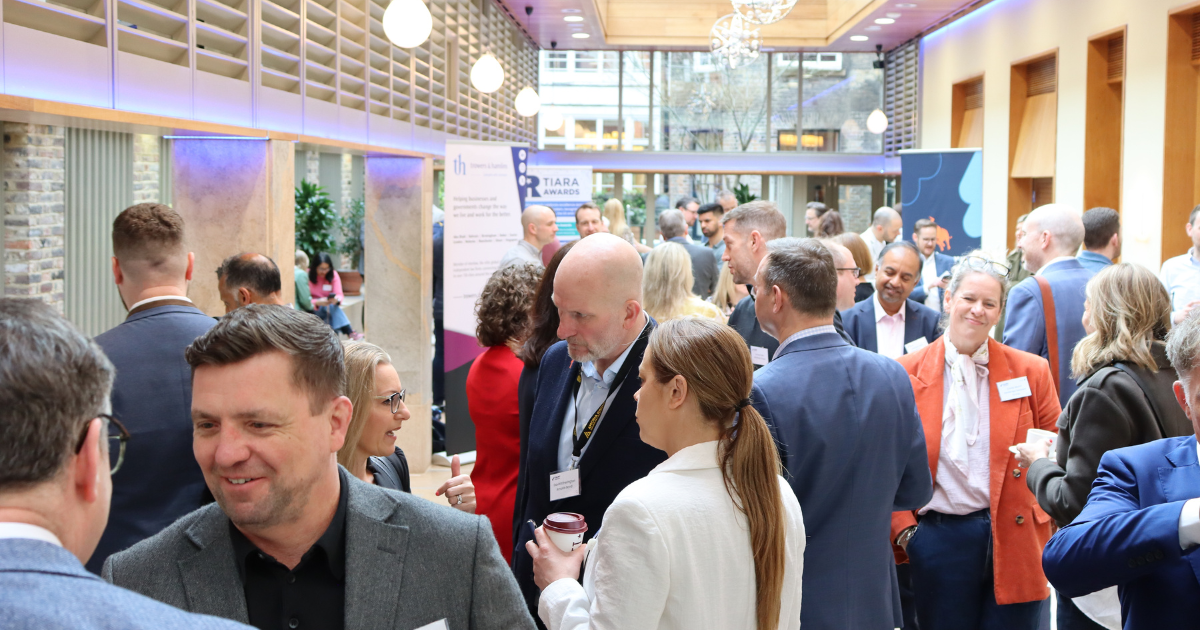Highlights from this year’s Future of Staffing & Talent Solutions Summit
As leaders grapple with unprecedented change in the recruitment sector, TALiNT Partners first Summit of 2025 for Staffing & Talent Solution leaders brought together some of the most forward-thinking minds in talent, technology, and workforce strategy for market and industry predictions. A packed agenda with four expertly curated panels kicked off with analysis on global workforce and hiring trends, employer priorities and opportunities for recruiters.
TALiNT Partners MD Alex Evans set the scene with stats on hiring demand, demographic trends and the future of work. “We’re in a recruitment paradox of growing skills shortages versus job cuts. Accelerating retirement & declining birth rates are creating labour shortages around the world just as AI displaces and creates millions of new roles. The question for the sector is whether the future is tech enabled recruiters, or recruiter enhanced tech.”
Transformation as usual is the new normal
To illustrate the Summit’s main theme of transformation as usual, Ken Brotherston, Founder and Chair at TALiNT Partners, charted a compelling timeline of volatility—from the post-Spanish flu of the 1920s to the AI revolution of the 2020s, arguing that today’s change is more profound and accelerated than ever before. Ken observed that we have moved beyond economic cycles into a world shaped by overlapping global events, technological disruption, and an uncertain geopolitical climate.
He underscored the two biggest forces reshaping our sector today: the shift to skills-based hiring and the widespread impact of AI. “There’s an enormous opportunity for providers who can be faster, more connected, and more collaborative,” he said. “This isn’t about riding out change. It’s about leading through it.”
Panel 1: Who Will Survive and Thrive in 2025?
TALiNT Partners CEO Jo Matkin moderated the first panel of leaders from staffing, talent solutions, compliance and employment law for industry predictions and insight on how to build resilience over the next 12 to 18 months.
Trowers & Hamlins’ Nicola Ihnatowicz urged recruiters to stay informed about the Employment Rights Bill and implications for agency workers to avoid falling into regulatory traps and add value for their clients. Giant Group’s Dan Haslam recommended that recruiters position themselves as “trusted advisors” who can simplify complexity for employers.
Nicola McQueen, CEO of NHS Professionals, shared her leadership lessons from rapidly adjusting business strategy to adapt to changing market forces and governments: “Resilience for us has come from agility. Over the last five years we have launched new services, spun up and reshaped entire business towers within a year, pivoted quickly, and stayed obsessively close to the customer.”
Victoria Short, CEO of Randstad UK, shared her focus for smarter adoption of AI and a more equitable approach to upskilling, especially among female employees who aren’t taking up training as much as men. “This is a productivity revolution, but we risk widening the pay gap if we don’t help women embrace these tools.”
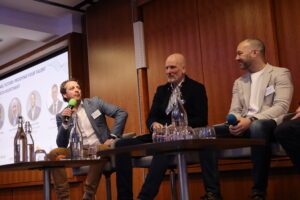

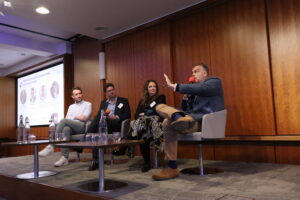
Panel 2: Future-Proofing Talent and Tech
What does it take to build a future-fit recruitment business, and how do leaders balance investment in people with tech?
Our second panel brought together perspectives on talent strategy from two TIARA award winning recruitment businesses – Gattaca and Amoria Group.
Amoria Group CEO David Etherington shared how their 10-step development pathway, refined over recent years, has re-engaged experienced employees and helped to build long-term client loyalty. “Not everyone wants to manage or sell,” he explained. “We created new roles for strategic individual contributors, and it’s helped us grow into consulting and value-led services.”
Matthew Wragg, crowned TIARA Recruitment Leader of the Year in 2024, talked about the role of training, transparency, clear communication and a strong EVP in creating Gattaca’s “boomerang culture” where former employees had returned because they recognised a business that listens, adapts, and invests in its people.
Offering different perspectives on the role of tech, Bullhorn’s Shaun Weise said it was still enhancing rather than replacing recruiters who need to upskill with AI. Trowers & Hamlins Steven Raize looked through an M&A lens to observe that investors and acquirers want to see an AI strategy and strong AI adoption to maximise revenue per head.
Panel 3: Sales & marketing solutions for future success
In a market with fewer opportunities, how are sales and marketing teams collaborating to win the right clients and grow the value of existing ones?
Mike Chapman shared his data strategy to enable AI in his role as CIO of Phaidon International: “Every leader in the business has had a data quality score in front of them for the last year. You cannot get promoted if your data quality is not right and you won’t qualify for commission either.”
Aine Fanning, Cpl’s Chief Sales & Marketing Officer, explained how she has brought her candidate and client marketing teams together with rev ops to create a more joined up sales enablement process. “This has resulted in new services and specialisms, like our sustainability desk, which has won new clients.”
SourceWhale CRO Dougie observed a growing focus for recruiters on clients more likely to deliver repeat business and initiatives like quarterly customer advisory boards to identify new upsell opportunities. Jonathan Firth, UK&I head of recruitment solutions at LHH said cross-selling was a big focus, but you need to be able to offer and deliver a wider portfolio of services and a more strategic approach to sales, not promoting each service individually.
Panel 4: Solutions to capitalise on global growth
The final panel looked at how to tap into global markets through expansion and M&A.
As employers look for more agile resourcing solutions and global talent pools, nearly half of the world’s workforce is self-employed and both the gig economy and freelance platform market is predicted to triple over the next five years. However, Governments are trying to increase tax revenues by pushing more into employment status, creating a more complex regulatory landscape to navigate.
“Governments are acting against market demand, and employers are terrified of compliance risk, so they are looking to their recruiters – and their strategic partners – to manage that complexity,” said WorkWell Global MD Amy Davies.
Olly Harris, Global MD of PageGroup, explained that a focus on enterprise solutions for clients who want to buy cross-border, multi country services with combined outsourcing and staffing solutions was enabling Page to differentiate as a global partner.
With 20% of the world’s businesses on Salesforce, TargetRecruit’s Cerys Holding explained why tech solutions in this marketplace help to deliver for global clients. Blackwood Capital’s Ronny Grosman concluded with a prediction for more M&A activity to find growth in 2025, with US and Asian buyers looking to Europe and the UK and PE needing to deploy funding. “But we need companies hitting their budgets again,” he said.
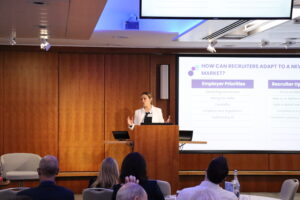
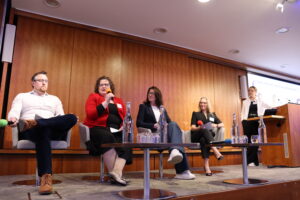
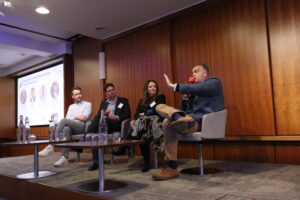
Keynote: Leading through change
The Summit closed with advice on leading through change from Bev White, who has led the global transformation of Nash Squared as its CEO since 2020. Bev tied together many of the key themes of the day, from recruiting new roles like prompt engineers to maximise AI and building capability around the most in-demand services to being present as a leader to listen to your team. Her final thought amplified an underlying theme of focusing on client retention and development in a market with fewer opportunities. “Find ways to listen to your customer and changing needs because If you’re not solving your client’s next problem, someone else will.”
Become a member & stay ahead of the curve
TALiNT Partners membership is valued for the quality of its network, peer learning and advisory services to help leaders in staffing and talent solutions understand the changing priorities of employers, based on constantly updated insight from its global TA leader community. To find out more about how membership can support your leadership team, contact alex@talintpartners.com

